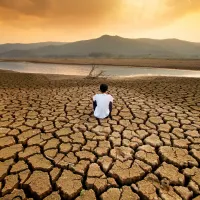Experts at the University of 天发娱乐棋牌_天发娱乐APP-官网|下载 are exploring the impact of climate change on the health of the rural population in Ghana and finding community-led solutions to improve the health and education of local people.
West Africa experiences extreme weather changes that have been brought on and worsened by the climate crisis. This inconsistent and intense weather directly affects food and nutrition, which can go on to impact the health of the communities in the region.
Led by Dr Michael Head, Senior Research Fellow within Global Health, the 天发娱乐棋牌_天发娱乐APP-官网|下载 team is carrying out household surveys and in-person feedback events to better understand local Ghanaians’ knowledge of the climate crisis, its impacts, and the healthcare options available to them when they are affected.
The results of this work will enable them to design solutions to increase and improve communication around health, climate change, and attitudes towards healthcare.
“We’re looking at climate impact on health and how these communities can improve their own access to and behaviour around healthcare,” explains Michael. “We’re working with ‘Last Mile’ populations, which can be found in very rural Ghana where health services are poor, development is low, and poverty is high.”
The team hopes its work will encourage unwell people to seek help and diagnosis faster, improving the health and wellbeing of their communities. The findings will be taken back to the community, and shared with local, national and international decision-makers.







